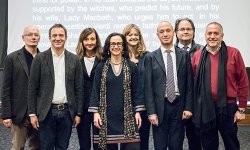Reading Foreign Voices: An Interdisciplinary Conversation about Audiovisual Translation
Posted in: CHSS News, Inserra, Italian News and Events

Who creates the subtitles for movies or surtitles for opera and according to what practices and goals? The December 5th program Reading Foreign Voices presented and sponsored by the Inserra Chair in Italian and Italian American Studies in collaboration with the Department of Spanish and Italian brought a group of international and local experts to Montclair State University with the goal of providing information about the fascinating interdisciplinary field of titling and discussing the current state-of-the-art. (The video below provides an overview of some of the topics covered during the day by the guest speakers.)
While providing an introduction to new technologies such as Google Translate, Google Glass, and the ubiquitous smartphone that have recently advanced the field of titling, the presenters at the program repeatedly emphasized the importance of possessing a diverse collection of humanities-related skills, in addition to the core skill of translation, as part of being a good titler. Professor Raúl Galoppe who teaches a subtitling class in the Department of Spanish and Italian at Montclair State University remarked on the importance of cultural knowledge and sensibilities and mentioned that he often tells his students that titling is an art. Mauro Conti (Founder of Prescott Studio, Italy) and LeAnn Overton (Met Opera Title Caller) focused on the role of rhythmic precision as well as creative improvisation in producing titles for live performances. Somewhat ironically, all the presenters agreed that perfection in titling is only attained when the audience perceives the titles as being seamlessly integrated into the relevant programming and the work of the titler vanishes!
Increasing globalization and in particular the ease with which one can now share multimedia material through the Internet have acted as a significant spur to the demand for titling. Indeed, Federico Spoletti, the Managing Director of Sub-Ti, London, observed that the role of the accessibility director has become ever more crucial with titling becoming an integral part of many TV and film productions. It is clear that titling makes these programs not only more accessible but also more profitable in the international market. Elena Di Giovanni (University of Macerata, Italy), who ran a workshop on subtitles for film on Dec. 5, highlighted the numerous applications of titling for sight- and hearing-impaired people, TV captions and educational materials, while also bringing the attention to the intra-linguistic use of titles (captions in the same language as the audio) next to the inter-linguistic one (translation). Commenting on the “interference” produced by sub/sur-titles, Jedediah Wheeler, the Director of the Kasser Theater/ACP at Montclair State University, called instead for the creative “inclusion” of translation into the very production of works presented to a foreign audience in order to respect the original text produced by the author.
In summary, the rich one-day program made the audience aware of the vast possibilities offered by audiovisual translation. On campuses like Montclair State University where foreign languages and the performing arts along with communication and media constitute key academic disciplines, audiovisual translation has the potential to connect and enhance several fields while further internationalizing the university curriculum and cultural programming, as has already been the case for several European universities. The overall message coming from Reading Foreign Voices is that sub/sur-titling and by extension audiovisual translation is far from being a niche area of specialization: it is now a fundamental tool of communication in our globalized world. And, while machine-assisted translation will continue to grow thanks to increasingly refined algorithms, human involvement remains critical for the purposes of editing and producing high-quality output. There is also robust demand for translation services given the vast and constantly growing amount of text available online. “Well-prepared and culturally/technologically savvy graduates in translation are increasingly needed in a trans-national context that is attentive to both the humanities and entrepreneurship,” as Teresa Fiore (Inserra Chair) and Marisa Trubiano (Department of Spanish and Italian) remarked after a concluding meeting with faculty and administrators.
The broad appeal of Reading Foreign Voices was reflected in the audience, which included faculty and students from the Spanish, Italian, French and Linguistics departments, along with high school students from Italian classes at Middletown High School North in Central NJ. The event was presented under the auspices of the Italian Cultural Institute in New York (with the participation of cultural attaché Fabio Troisi) as part of the Italian semester of presidency of the European Union Council, and consequently functioned as a reminder of the interconnectedness of languages and cultures and the role of supra-structures to protect and constantly revitalize them.
